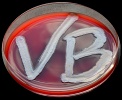| Species/Subspecies: | Campylobacter upsaliensis | ||||||||
|---|---|---|---|---|---|---|---|---|---|
| Categories: | Motile; notifiable diseases and bacteria | ||||||||
| Etymology: | Genus name: a curved rod. Species epithet: of Uppsala, where the bacterium was first described at the Swedish University of Agricultural Sciences (SLU). | ||||||||
| Significance: | [Important] | ||||||||
| Taxonomy: | Class Campylobacteria Order Campylobacterales Family Campylobacteraceae Genus Campylobacter |
||||||||
| Type Strain: | C231 = ATCC 43954 = CCUG 14913 = NCTC 11541. | ||||||||
| Macromorphology (smell):
| Small pinpoint like colonies, which are non-hemolytic and swarm on moist agar. | ||||||||
| Micromorphology: | Curved or helical and motile rod (0.3-0.4 x 1.2-3.0 µm). | ||||||||
| Gram +/Gram -: | G- | ||||||||
| Metabolism: | Microaerophilic | ||||||||
| Catalase/Oxidase: | -/+ | ||||||||
| Other Enzymes: | Hippuricase - (= hippurate -), urease - | ||||||||
| Biochemical Tests: | Hydrogen sulfide (H2S) + | ||||||||
| Fermentation of carbohydrates: | Campylobacter spp. can neither ferment nor oxidize carbohydrates. | ||||||||
| Spec. Char.: | Thermotolerant. Does not grow at 25°C, but at 42°C. | ||||||||
| Special Media: | |||||||||
| Reservoir: | Dogs and cats | ||||||||
| Disease: | Enteritis |
||||||||
| Hosts: | Dog? cat? and humans? | ||||||||
| Clinical Picture: | |||||||||
| Diagnostics: | Direct culture on selective media or culture after selective enrichment. Confirmation by MALDI-TOF, PCR or other molecular methods. Biochemical tests can also be used for confirmation. | ||||||||
| 16S rRNA Seq.: |
| ||||||||
| Taxonomy/phylogeny:
|
About 50 species have been described within in the genus Campylobacter and some of these are further divided into subspecies. This genus is closely related to the following genera: Sulfurospirillum, Arcobacter and Helcobacter. C. upsaliensis is closely related to C. helveticus and C. avium. | ||||||||
| Legislation: | In Sweden, human campylobacteriosis is notifiable to the Public Health Agency of Sweden. | ||||||||
| Reference(s): | No. 47 | ||||||||
| Updated: | 2025-10-27 |
